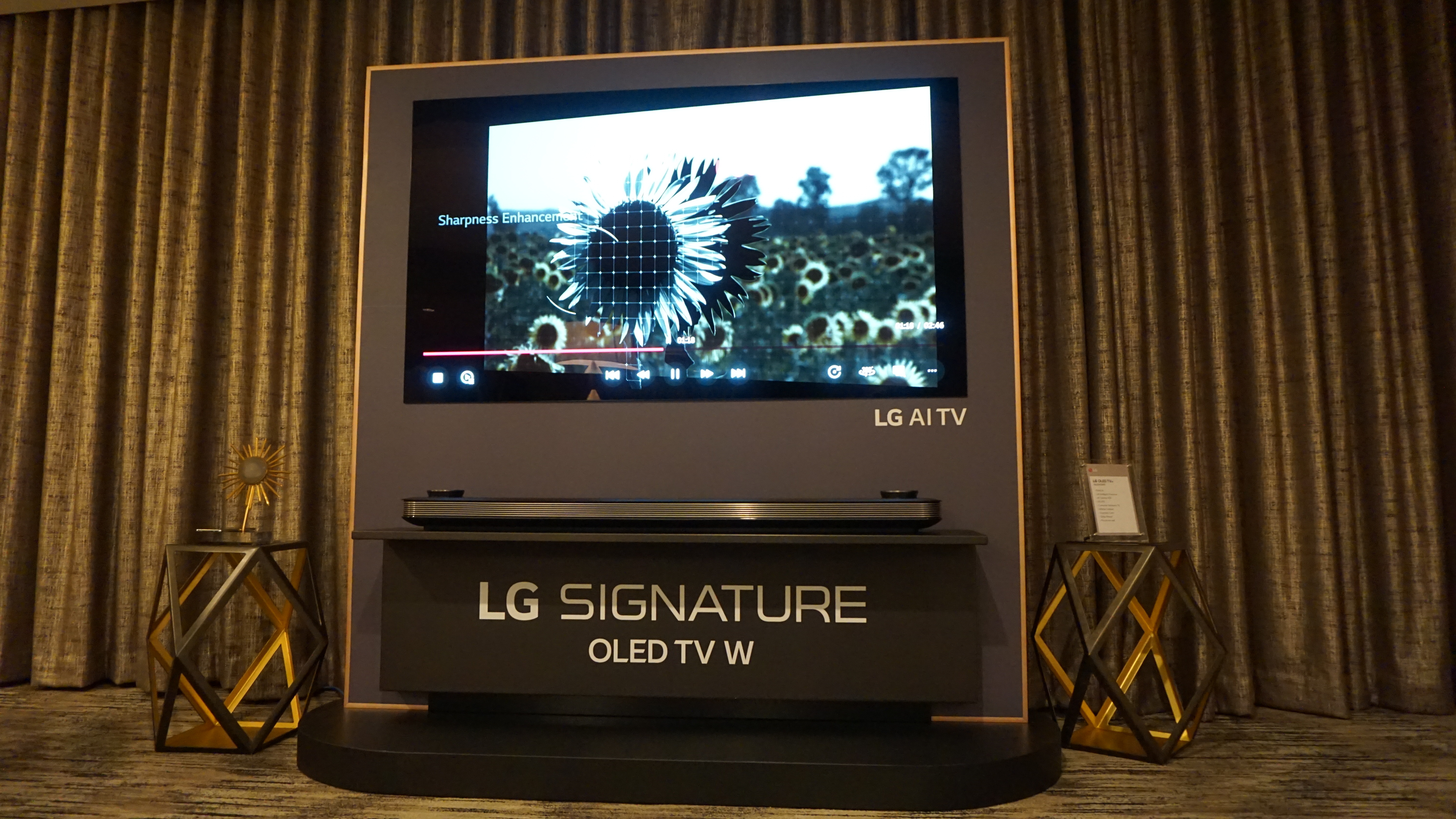Early Verdict
The LG Signature OLED W8 (OLED65W8) doesn’t rewrite the book on LG OLED panels - in fact, there’s no tangible improvement to the panel from last year to this year. But, that being said, several improvements to the software side of things, including a larger look-up table and Google Assistant, make this year’s W8 a serious contender in the upcoming battle for ‘best TV of 2018’.
Pros
- +
More vivid colors
- +
Google Assistant built-in
- +
Dolby Atmos soundbar
- +
Four types of HDR
Cons
- -
Same panel as last year
- -
No increase in brightness
- -
Soundbar is still 4.2
Why you can trust TechRadar
While other TV manufacturers are touting 8K upscaling and MicroLED screens, LG’s best and brightest consumer-ready panel at CES 2018 is the LG Signature OLED W8 - a continuation of last year’s W7 OLED that we loved, now with a new ‘Alpha 9’ processor and Google Assistant. (LG Display, a sister company to LG Electronics, has a new prototype 65-inch foldable OLED screen - but that’s a story for another article.)
Beyond the new additions of the processor and Google Assistant, the W8 comes equipped with a 4.2 Dolby Atmos soundbar attached via a flat cable that runs into the TV itself - the latter of which still measures in at an unbelievably thin 2.57mm from front to back.
We saw the TV ahead of the show during a behind-closed-doors demo and while LG’s latest flagship OLED doesn’t reinvent the wheel like it did in 2017, the Signature W8 OLED will look to make minor improvements on LG’s top TV tech when it comes out later this year.
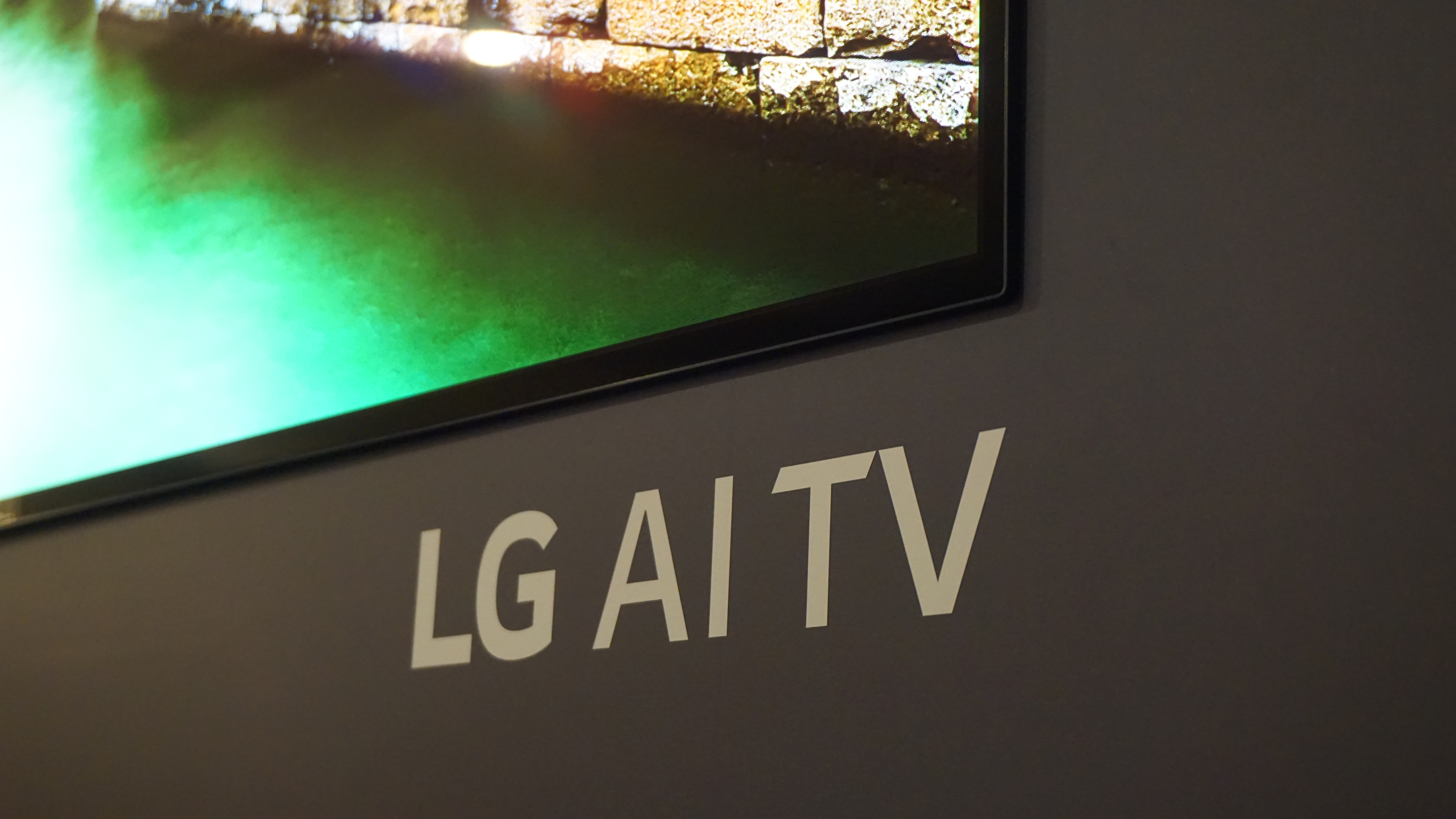
Design
It’s hard to walk away unimpressed after spending time with the LG Signature OLED W8. It’s slim, fits seamlessly onto the wall and it comes with a Dolby Atmos soundbar. LG calls the design aesthetic ‘picture-on-wall’ and, put in front of a non-techy, it would definitely give the illusion of a beautiful art display.
Last year, we had problems with the TV’s exclusive use of the soundbar as its primary source to route cables in and out of the TV. And while that’s a problem that persists this year, it’s something that we’ve slowly warmed up to. The soundbar - while still not being a true 5.1.2 solution - has enough oomph to deliver the ideal sound to match the stunning images.

As far as we know, like last year’s TV, the W8 OLED won’t come with a stand. It’s wall-mount or bust. And while that could sound a bit frightening to the non-AV enthusiasts out there, the W8 will employ the same mounting mechanism that it had last year to enable supremely easy setup.
Lastly, while many of us got excited about the HDMI 2.1 spec that was solidified near the end of last year, LG representatives told us that it came out a bit too late to be included on any of this year's models. We were told that it would be possible that some of the improvements promised by the spec - like broadcast metadata interpretation and high frame rate (HFR) - could make their way into this year's models at some point via a software update, but 4K120 won't be happening on this year's models via HDMI.
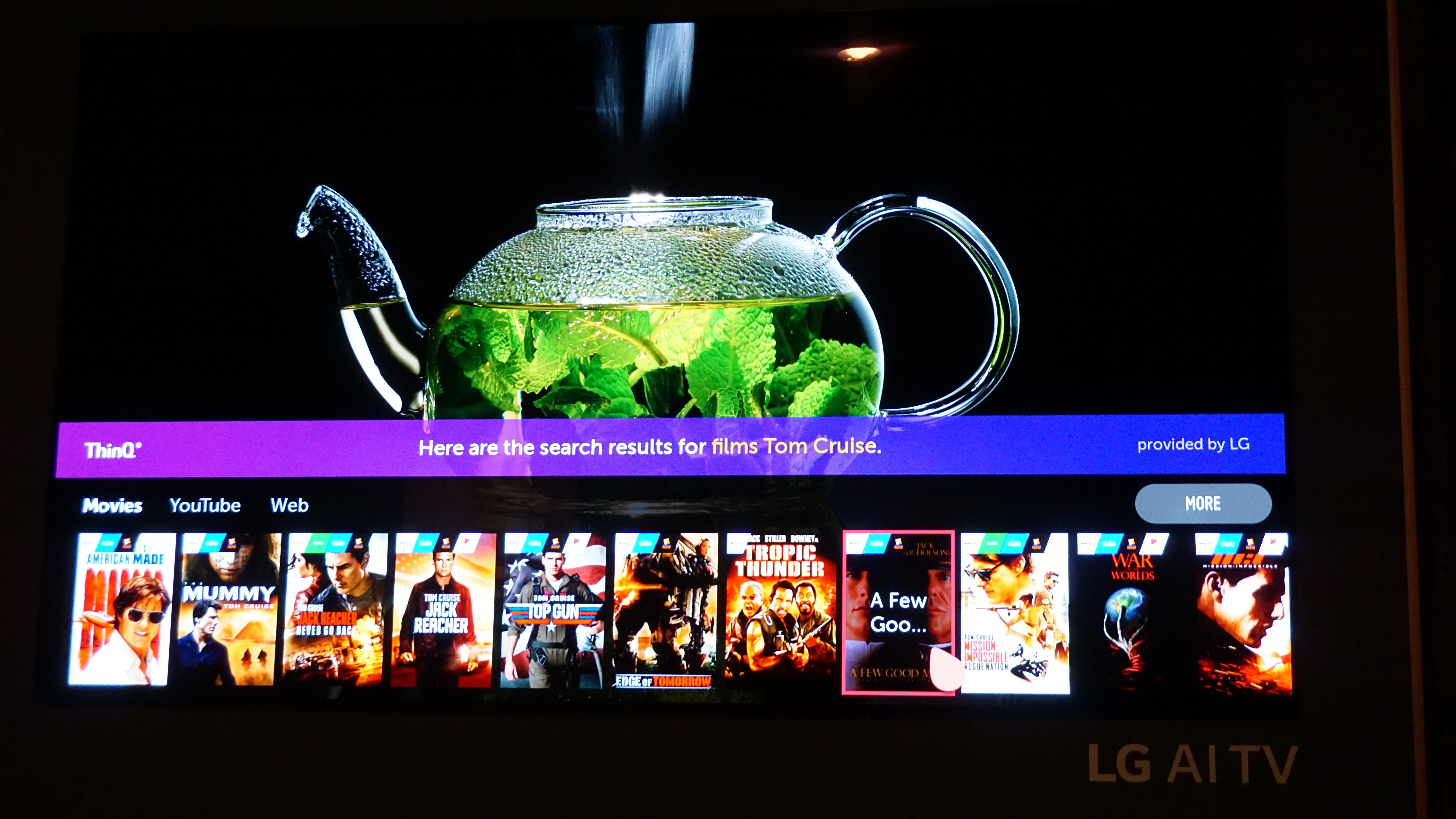
Smart TV (webOS with Google Assistant)
Of course, it wouldn’t be an OLED demo without seeing the latest in webOS, the operating system used on the vast majority of LG TVs.
This year’s flavor - called webOS with Google Assistant - is similar in a lot of ways to last year’s webOS 3.5. Much of the layout and content highlighting features remain exactly the same as they were last year.
The difference between the two, however, is the addition of Google Assistant - which promises to deliver the same experience you’re used to having on your phone on the biggest screen in the house.
The benefits of Google Assistant include the ability to uses voice commands to control TV functions, search for content over-the-air or on various streaming partners, or control other connected IoT devices in the network. It’s like having a Google Home built into your TV - and could be an especially useful feature for those of us with burgeoning smart homes.
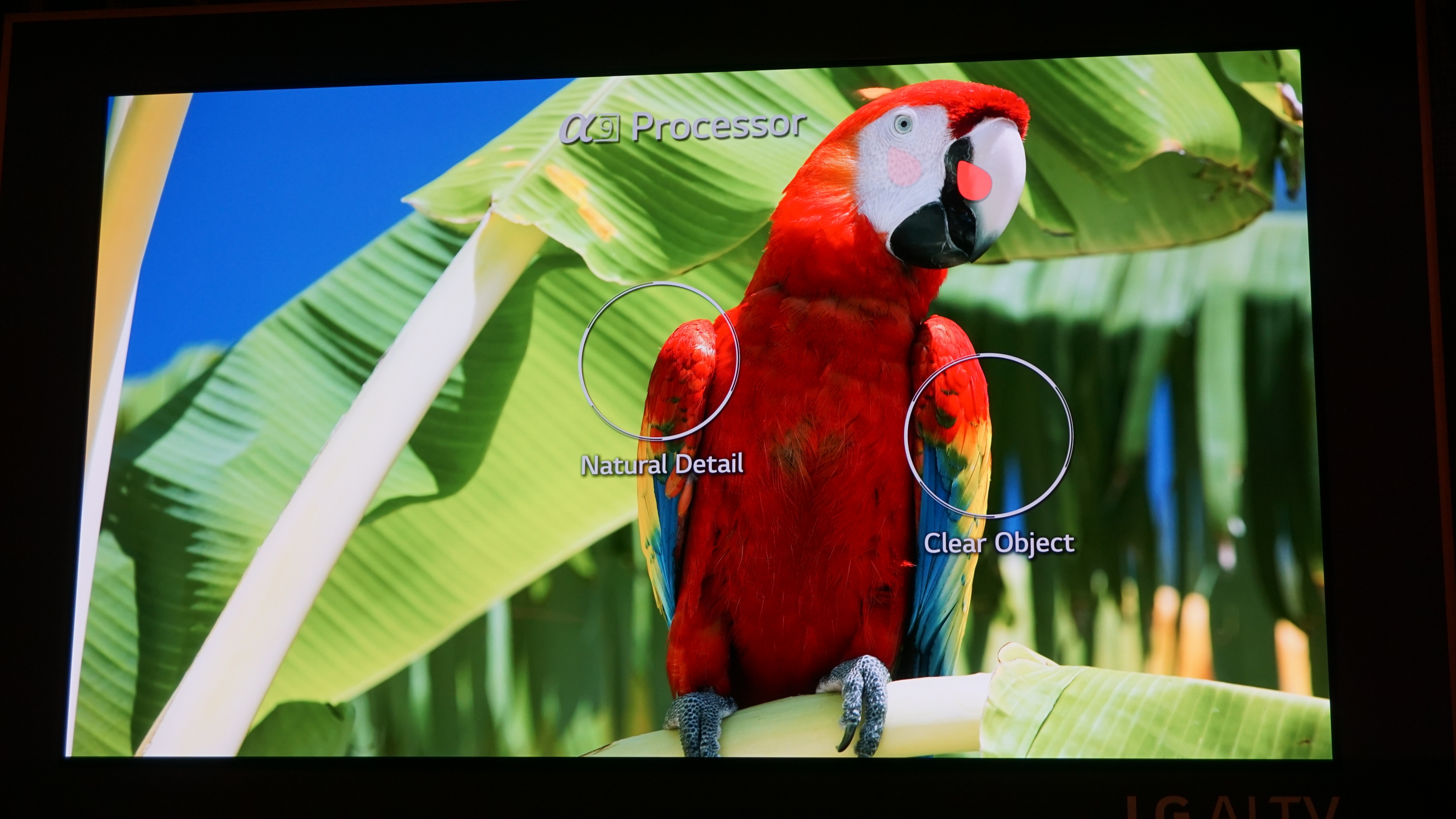
Performance
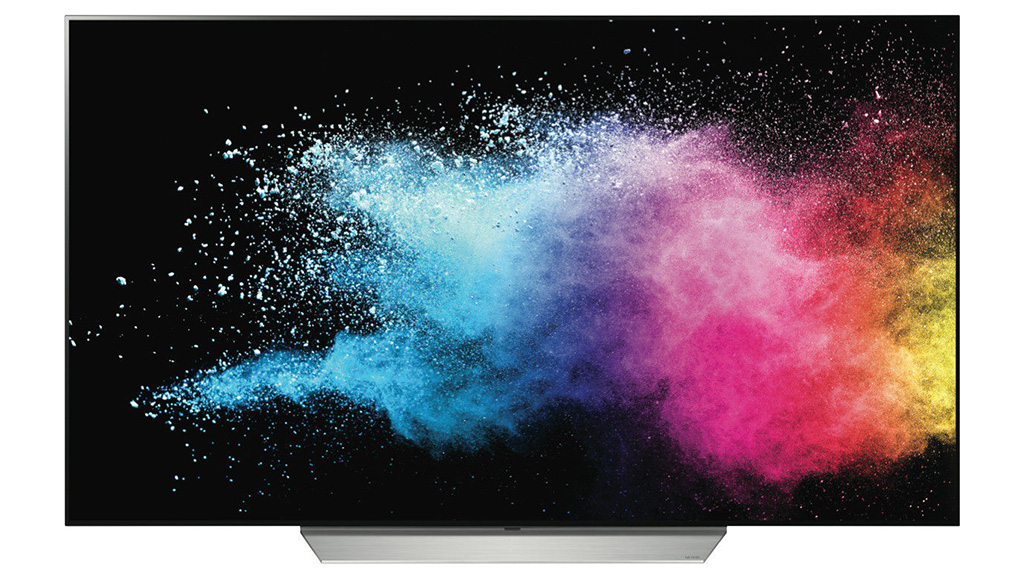
Want to see every LG TV coming in 2018? Don't miss this LG TV 2018 Catalog!
Here’s the part where we usually espouse the goodness that is OLED panel technology. We gush about the inky black levels and, now, even more colorful images. We could talk about those things ad nauseum, but you know all that already.
Instead of drowning you in yet another explanation of OLED’s many perks, let’s instead talk about the improvements made from last year.
The most notable improvement is LG’s use of the Alpha 9 processor for better contouring between areas of bright light and darkness (like, say an image of a moon on a dark night) and motion processing. In a demo of the E8 OLED, we were able to see just how well the new Alpha 9 processor stood up against another leading OLED panel. In short, the OLED E8 was not only brighter, but it held up with the action better, too, making sure that images stayed clear as the camera panned from shot to shot of a cityscape.
The Alpha 9 processor will also enable a massive leap in the look-up table - a term you’ll be hearing a lot from LG in the New Year. A look-up table is a way to color correct source input. Using what’s called a 3-D reference table, colors can be corrected on an individual basis - if a blue is too blue, for example, it can be made less blue without impacting the green or red tones in the same image. For this example, LG used a video of a parrot to show how clarity and color processing coalesced to create a more refined, vibrant image.
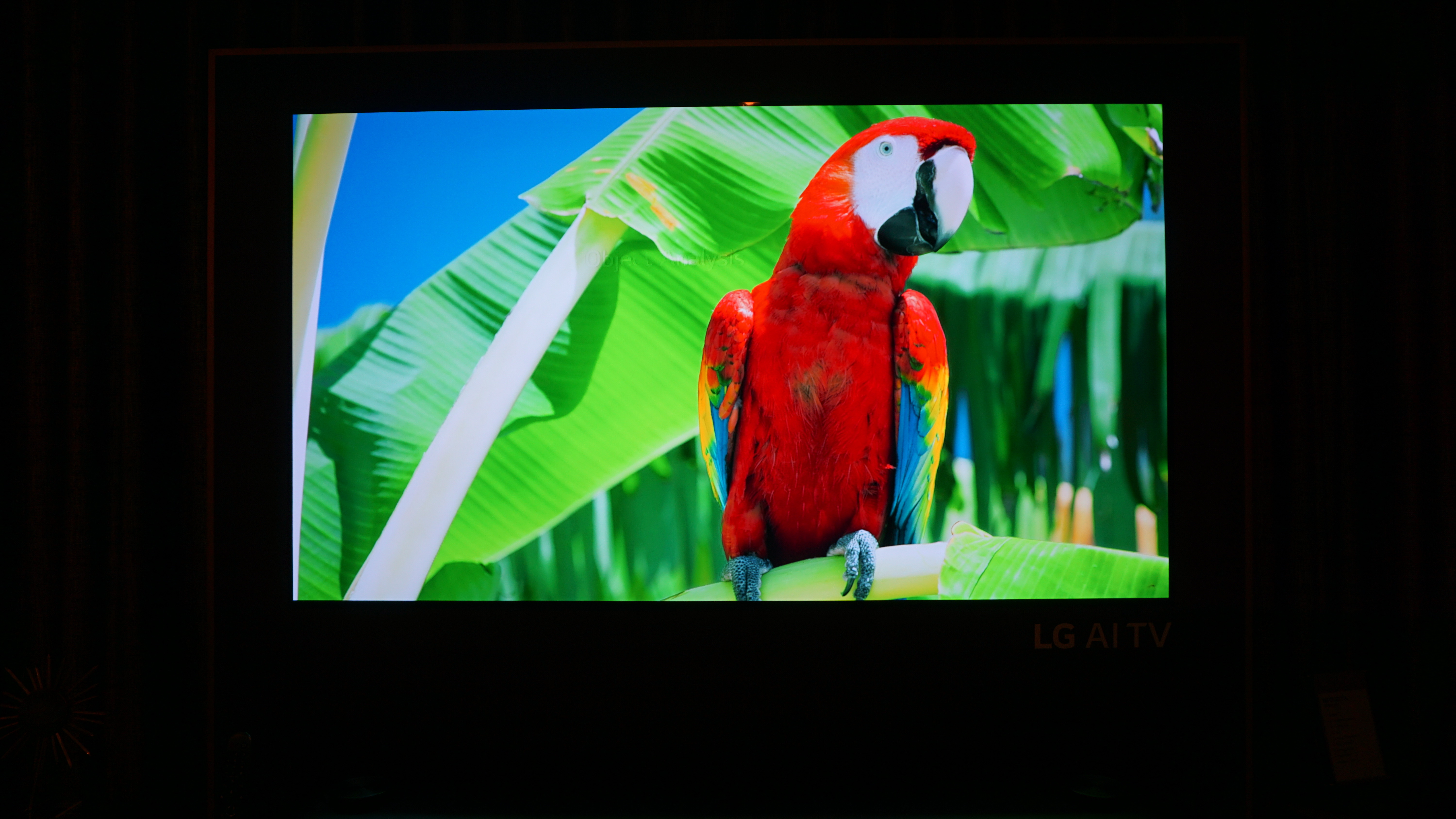
And while image processing seems to have received a major overhaul this time around, an LG representative told us the panels are more or less the same as the ones used last year. That means no change to the overall brightness of the panels - which means HDR content could look more or less the same as it did last year, barring a few minor tweaks.
Speaking of HDR, all the 8-series OLEDs (the W8, G8, E8, C8 and B8) will all support four kinds of HDR formats - HDR10, Dolby Vision, Advanced HDR by Technicolor and HLG. This will work in tandem with LG’s proprietary HDR Pro and HLG Pro technology that works on a scene-by-scene basis to find the correct balance between low-points and highlights.
Early verdict
Although it’s not a massive improvement on last year’s near-perfect W7 OLED, the W8 has a lot of promise. It’s a bit smarter and better looking with its new Alpha 9 processor powering advanced clarity and color processing, and while HDR performance hasn’t received a major boost in power, it still looks tremendous compared to other competitor’s OLED screens.
We’re not entirely sold on the idea that the W8 will spin circles around the competition this year - especially given the fact that no tangible improvements have been made to the panel itself - but we’re confident in saying that the W8 will likely be worthy of a spot on your wall when it releases later this year around the spring.
- New year, new tech – check out all our coverage of CES 2018 straight from Las Vegas, the greatest gadget show on Earth
Nick Pino is Managing Editor, TV and AV for TechRadar's sister site, Tom's Guide. Previously, he was the Senior Editor of Home Entertainment at TechRadar, covering TVs, headphones, speakers, video games, VR and streaming devices. He's also written for GamesRadar+, Official Xbox Magazine, PC Gamer and other outlets over the last decade, and he has a degree in computer science he's not using if anyone wants it.
What is a hands on review?
Hands on reviews' are a journalist's first impressions of a piece of kit based on spending some time with it. It may be just a few moments, or a few hours. The important thing is we have been able to play with it ourselves and can give you some sense of what it's like to use, even if it's only an embryonic view. For more information, see TechRadar's Reviews Guarantee.
